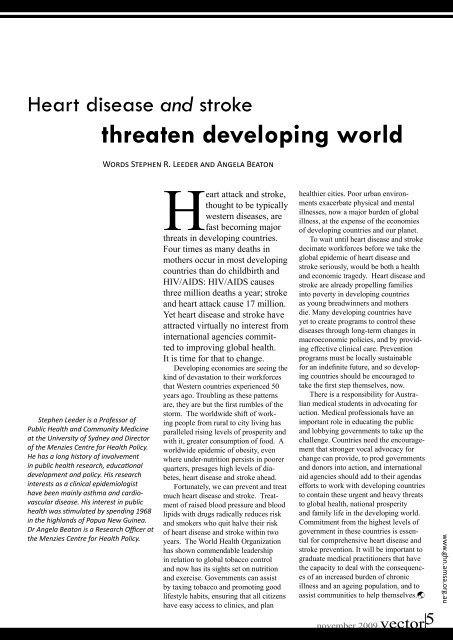You also want an ePaper? Increase the reach of your titles
YUMPU automatically turns print PDFs into web optimized ePapers that Google loves.
Heart disease and stroke<br />
threaten developing world<br />
Words Stephen R. Leeder and Angela Beaton<br />
Stephen Leeder is a Professor of<br />
Public Health and Community Medicine<br />
at the University of Sydney and Director<br />
of the Menzies Centre for Health Policy.<br />
He has a long history of involvement<br />
in public health research, educational<br />
development and policy. His research<br />
interests as a clinical epidemiologist<br />
have been mainly asthma and cardiovascular<br />
disease. His interest in public<br />
health was stimulated by spending 1968<br />
in the highlands of Papua New Guinea.<br />
Dr Angela Beaton is a Research Officer at<br />
the Menzies Centre for Health Policy.<br />
Heart attack and stroke,<br />
thought to be typically<br />
western diseases, are<br />
fast becoming major<br />
threats in developing countries.<br />
Four times as many deaths in<br />
mothers occur in most developing<br />
countries than do childbirth and<br />
HIV/AIDS: HIV/AIDS causes<br />
three million deaths a year; stroke<br />
and heart attack cause 17 million.<br />
Yet heart disease and stroke have<br />
attracted virtually no interest from<br />
international agencies committed<br />
to improving global health.<br />
It is time for that to change.<br />
Developing economies are seeing the<br />
kind of devastation to their workforces<br />
that Western countries experienced 50<br />
years ago. Troubling as these patterns<br />
are, they are but the first rumbles of the<br />
storm. The worldwide shift of working<br />
people from rural to city living has<br />
paralleled rising levels of prosperity and<br />
with it, greater consumption of food. A<br />
worldwide epidemic of obesity, even<br />
where under-nutrition persists in poorer<br />
quarters, presages high levels of diabetes,<br />
heart disease and stroke ahead.<br />
Fortunately, we can prevent and treat<br />
much heart disease and stroke. Treatment<br />
of raised blood pressure and blood<br />
lipids with drugs radically reduces risk<br />
and smokers who quit halve their risk<br />
of heart disease and stroke within two<br />
years. The World Health Organization<br />
has shown commendable leadership<br />
in relation to global tobacco control<br />
and now has its sights set on nutrition<br />
and exercise. Governments can assist<br />
by taxing tobacco and promoting good<br />
lifestyle habits, ensuring that all citizens<br />
have easy access to clinics, and plan<br />
healthier cities. Poor urban environments<br />
exacerbate physical and mental<br />
illnesses, now a major burden of global<br />
illness, at the expense of the economies<br />
of developing countries and our planet.<br />
To wait until heart disease and stroke<br />
decimate workforces before we take the<br />
global epidemic of heart disease and<br />
stroke seriously, would be both a health<br />
and economic tragedy. Heart disease and<br />
stroke are already propelling families<br />
into poverty in developing countries<br />
as young breadwinners and mothers<br />
die. Many developing countries have<br />
yet to create programs to control these<br />
diseases through long-term changes in<br />
macroeconomic policies, and by providing<br />
effective clinical care. Prevention<br />
programs must be locally sustainable<br />
for an indefinite future, and so developing<br />
countries should be encouraged to<br />
take the first step themselves, now.<br />
There is a responsibility for Australian<br />
medical students in advocating for<br />
action. Medical professionals have an<br />
important role in educating the public<br />
and lobbying governments to take up the<br />
challenge. Countries need the encouragement<br />
that stronger vocal advocacy for<br />
change can provide, to prod governments<br />
and donors into action, and international<br />
aid agencies should add to their agendas<br />
efforts to work with developing countries<br />
to contain these urgent and heavy threats<br />
to global health, national prosperity<br />
and family life in the developing world.<br />
Commitment from the highest levels of<br />
government in these countries is essential<br />
for comprehensive heart disease and<br />
stroke prevention. It will be important to<br />
graduate medical practitioners that have<br />
the capacity to deal with the consequences<br />
of an increased burden of chronic<br />
illness and an ageing population, and to<br />
assist communities to help themselves.<br />
november <strong>2009</strong> vector5<br />
www.ghn.amsa.org.au
















